Can Nootropic Supplements Make You More Resilient to Sleep Loss?
Introduction
You’ve probably been there — late nights, early mornings, and an extra cup (or three) of coffee to survive the day. ☕😴 Whether it’s work deadlines, travel, or parenting, modern life often means sacrificing sleep.
But what if you could buffer the effects of sleep deprivation — staying sharp, focused, and emotionally stable even when your sleep is less than ideal?
Enter nootropics — a class of natural and synthetic compounds that enhance cognitive performance. Some nootropics not only boost focus and memory but also help the brain adapt to stress and fatigue, making you more resilient when sleep is scarce.
Let’s explore what the science says about nootropics and sleep loss — and how to use them safely without burning out your nervous system. 🌿💊
Looking for supplements for Brain Fog? Click here.
🌙 Why Sleep Deprivation Wrecks Mental Performance
Before we dive into nootropics, it’s important to understand why sleep loss hits so hard.
When you don’t get enough rest:
🧠 Brain fog sets in because neurons can’t clear metabolic waste (like adenosine).
⚡ Neurotransmitter balance (dopamine, serotonin, acetylcholine) breaks down.
🔋 Energy production in mitochondria drops, reducing focus and motivation.
🧬 Stress hormones like cortisol spike, impairing memory and emotional control.
After even one night of poor sleep, reaction time slows, decision-making worsens, and self-control plummets. Chronic deprivation leads to inflammation, anxiety, and metabolic issues.
💡 In short: no supplement replaces sleep — but the right ones can reduce the damage and speed recovery.
🧬 What Are Nootropics, Exactly?

The term “nootropic” was coined in the 1970s by Romanian scientist Corneliu Giurgea. He defined them as substances that:
✅ Enhance learning and memory
✅ Protect the brain from damage
✅ Improve communication between neurons
✅ Have minimal side effects
They’re often called “smart drugs” or “brain boosters.” But the best nootropics don’t just stimulate — they nourish and protect the brain.
Some nootropics are herbal (like Rhodiola and Ginseng), while others are amino acids or compounds found naturally in the body (like L-Theanine or Acetyl-L-Carnitine).
⚙️ Can Nootropics Really Offset Sleep Loss?
Studies suggest that certain nootropics can indeed improve mental resilience during sleep deprivation by:
Supporting neurotransmitter function
Enhancing blood flow to the brain
Reducing oxidative stress and inflammation
Stabilizing mood and stress hormones
These compounds don’t “replace” sleep — but they help your brain operate more efficiently under fatigue, making you more alert, balanced, and productive.
Let’s break down the most effective ones.
🌿 The Best Nootropics for Sleep Deprivation Resilience
🧠 L-Tyrosine: The Focus Preserver
When you’re sleep-deprived, your brain runs low on dopamine and norepinephrine — key chemicals for alertness and motivation.
L-Tyrosine is a precursor to both, helping restore cognitive function during stress and fatigue.
Benefits:
Improves focus and multitasking under pressure
Reduces cognitive decline from sleep deprivation
Enhances mood and motivation
Dosage: 300–600 mg before demanding tasks or early morning after poor sleep.
⚙️ Think of it as brain fuel when your reserves are running low.
⚡ Caffeine + L-Theanine: The Balanced Energy Duo
Caffeine boosts alertness by blocking adenosine (the molecule that builds up when you’re tired).
But caffeine alone can cause jitters, anxiety, and energy crashes.
L-Theanine, an amino acid from green tea, smooths out caffeine’s edge by promoting alpha brain waves — the calm-focus state.
Benefits:
Immediate alertness without anxiety
Better reaction time and sustained focus
Reduced fatigue and improved accuracy
Dosage: 100 mg caffeine + 200 mg L-Theanine (classic 1:2 ratio).
☕ For clean, calm energy — even on little sleep.
🌱 Rhodiola Rosea: The Stress-Resilience Herb
Rhodiola is an adaptogen — it helps your body maintain balance during stress, including sleep loss.
Benefits:
Boosts physical and mental endurance
Lowers cortisol levels
Reduces fatigue without overstimulation
Dosage: 200–400 mg standardized extract in the morning.
🌿 Perfect for people under constant pressure or irregular sleep schedules.
🔋 Coenzyme Q10 (CoQ10): The Cellular Energizer
CoQ10 supports mitochondrial energy production — crucial when your brain cells are struggling from lack of rest.
Benefits:
Increases brain energy
Reduces oxidative damage from fatigue
Supports heart and overall stamina
Dosage: 100–200 mg with breakfast.
⚡ Keeps your cellular batteries charged when sleep hasn’t.
💭 Alpha-GPC or Citicoline (CDP-Choline): The Memory Enhancers
Both Alpha-GPC and Citicoline are choline donors — nutrients that help the brain make acetylcholine, the neurotransmitter for focus and learning.
Sleep deprivation depletes acetylcholine, leading to forgetfulness and fog.
Benefits:
Improves working memory
Enhances learning speed
Supports long-term cognitive health
Dosage: 300–600 mg/day (morning or midday).
🧩 Think of it as lubrication for your brain’s communication system.
🌼 Panax Ginseng: The Natural Energy Restorer
Ginseng boosts energy metabolism and fights fatigue naturally.
Benefits:
Increases stamina and alertness
Supports mental performance under stress
Enhances immune and hormonal balance
Dosage: 200–400 mg standardized extract in the morning.
💪 Gentle stimulation without the crash.
🌙 Lion’s Mane Mushroom: The Neuro-Regenerator
Lion’s Mane promotes nerve growth factor (NGF), helping the brain recover from stress and burnout.
Benefits:
Supports neuroplasticity and cognitive repair
Reduces anxiety and inflammation
Enhances long-term focus and clarity
Dosage: 500–1000 mg/day (fruiting body extract).
🍄 Protects your brain so you can handle sleep debt without long-term damage.
💡 Phosphatidylserine: The Cortisol Balancer
This phospholipid helps maintain healthy cell membranes and supports stress hormone regulation.
Benefits:
Improves memory and processing speed
Reduces cortisol after sleep deprivation
Enhances attention and calmness
Dosage: 100–300 mg before bed or during the day.
🌿 Ideal for high-stress professionals or students pulling all-nighters.
🔬 Acetyl-L-Carnitine (ALCAR): The Brain Energizer
ALCAR boosts mitochondrial function and helps transport fatty acids into the brain for fuel.
Benefits:
Improves alertness and mental energy
Reduces fatigue and brain fog
Supports neurotransmitter synthesis
Dosage: 500–1000 mg with breakfast.
⚙️ A cognitive wake-up call for sleep-deprived neurons.
🧩 Stacking Nootropics for Sleep-Deprived Days
You don’t need everything at once — the key is combining complementary compounds for synergy.
Example Stack #1: “Cognitive Recovery” Stack (after poor sleep)
L-Tyrosine – 500 mg
Alpha-GPC – 300 mg
CoQ10 – 100 mg
Omega-3 – 1000 mg
🧠 Supports energy, focus, and memory throughout the day.
Example Stack #2: “Resilience Mode” Stack (for ongoing sleep restriction)
Rhodiola Rosea – 300 mg
Lion’s Mane – 1000 mg
L-Theanine – 200 mg
Magnesium Glycinate – 200 mg (evening)
🌿 Balances stress, restores calm focus, and promotes night recovery.
Example Stack #3: “Performance Under Pressure” Stack
Caffeine + L-Theanine combo
Alpha-GPC – 300 mg
ALCAR – 750 mg
Panax Ginseng – 200 mg
⚡ Boosts focus and reaction time without emotional crashes.
Looking for supplements for Brain Fog? Click here.
🌬️ Breathwork: A Natural Nootropic
When you’re sleep-deprived, your brain’s oxygenation and CO₂ balance are disrupted. Controlled breathing rebalances both, improving alertness and calm.
Try This: “Box Breathing” for Mental Stability
Inhale through your nose for 4 seconds
Hold for 4 seconds
Exhale for 4 seconds
Hold again for 4 seconds
Repeat for 3–5 minutes
Benefits:
Stabilizes heart rate and focus
Increases prefrontal cortex oxygenation
Reduces stress reactivity
🌬️ Combine this with Rhodiola or L-Theanine for an instant clarity reset.
Want to try Breathwork? Click Here.
🧘 Therapy: The Emotional Side of Sleep Loss

Lack of sleep doesn’t just affect cognition — it amplifies emotional volatility. Therapy helps address the psychological load that sleep deprivation magnifies.
Benefits of Therapy During Sleep Deprivation:
Reduces anxiety and rumination
Improves emotional regulation
Teaches recovery routines and boundaries
Prevents chronic stress cycles
CBT (Cognitive Behavioral Therapy) can also help replace “sleep guilt” with recovery-focused thinking — essential for high performers who can’t always rest as much as they’d like.
🧠 A balanced brain starts with balanced emotions.
Looking for online therapy ? Click Here.
🍽️ Nutrition Tips for Sleep-Deprived Brains
Supplements work best with proper nutrition.
Eat More:
🥑 Healthy fats (avocado, salmon, nuts) → brain energy
🍳 Protein-rich meals → amino acids for neurotransmitters
🫐 Antioxidant foods (blueberries, spinach) → fight oxidative stress
Avoid:
🧃 Sugar spikes → worsen brain fog
🍺 Alcohol → disrupts REM rebound
🕐 Late-night heavy meals → impair recovery sleep later
💡 Think of food as your baseline nootropic.
⚙️ The Limitations: Why Nootropics Aren’t a Sleep Replacement
While nootropics can temporarily improve resilience to sleep loss, they don’t repair the long-term damage caused by chronic deprivation.
⚠️ Over time, lack of sleep causes:
Hormonal imbalance
Impaired learning and memory
Increased risk of anxiety and depression
Nootropics are tools for recovery and mitigation, not excuses to skip sleep.
Think of them as seatbelts, not superpowers.
🧬 The Smart Way to Use Nootropics for Sleep Loss
✅ DO:
Use only on high-demand days (not daily)
Hydrate and eat balanced meals
Prioritize recovery sleep afterward
🚫 DON’T:
Stack too many stimulants
Skip rest days
Expect instant miracles
Consistency, not excess, builds real resilience.
🧘 Recovery Routine After Sleep Debt
After a tough stretch of low sleep, your goal is to rebalance your system.
Evening Recovery Routine:
Magnesium Glycinate – 300 mg
L-Theanine – 200 mg
Glycine – 3 g
Ashwagandha – 300 mg
🌙 Calms cortisol, relaxes muscles, and triggers deep restorative sleep.
💤 Combine this with 20 minutes of breathwork and 7–8 hours of uninterrupted rest for a full reset.
🧩 How to Measure Improvement
You’ll know your stack and strategy are working when:
✅ You can think clearly after poor sleep
✅ Your mood and patience improve
✅ You bounce back faster after stress
✅ Your recovery time shortens with consistent use
Track results with:
Sleep apps (e.g., Oura, Whoop)
Focus journals
Heart rate variability (HRV)
🌟 Final Thoughts
Sleep is irreplaceable — but your brain is adaptable. With the right nootropics, mindset, and recovery habits, you can mitigate the effects of sleep loss, stay composed under pressure, and protect your long-term cognitive health.
Use these tools wisely: fuel your neurons, calm your stress, and make recovery as strategic as your work.
✨ Nootropics don’t defy biology — they help you work with it smarter. 🌙🧠
📚 References
Wesensten NJ, et al. “The effect of sleep deprivation on cognitive performance.” Sleep. 2005;28(3):347–354.
Deijen JB, et al. “Tyrosine and cognitive performance during stress.” Pharmacol Biochem Behav. 1999;64(3):495–500.
Kennedy DO. “Nutritional nootropics and fatigue.” Nutrients. 2016;8(11):68.
Panossian A, Wikman G. “Adaptogens in fatigue and stress tolerance.” Pharmaceuticals. 2010;3(1):188–224.
Streeter CC, et al. “Breathwork and autonomic regulation.” J Altern Complement Med. 2012;18(5):402–412.
Related Posts
-
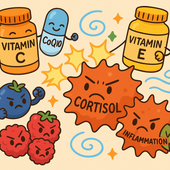
Antioxidants for Stress Management and Cortisol Control
When stress overwhelms your body, antioxidants come to the rescue. 🌿 Learn how vitamin C, CoQ10, and other natural compounds help reduce oxidative stress, regulate cortisol, and restore calm energy from within. ✨
-
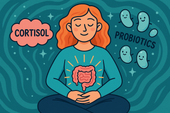
Cortisol and Gut Health: How Probiotics May Help
Chronic stress doesn’t just affect your mind — it changes your gut. 🌿 Learn how cortisol disrupts the microbiome and how probiotics can help restore balance, improve digestion, and calm your stress response naturally. ✨
-
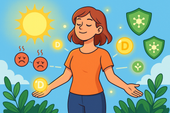
Vitamin D and Cortisol: Supporting Immune Balance
Vitamin D does more than strengthen bones — it helps regulate cortisol and support immune balance. 🌞 Learn how this essential hormone-like nutrient restores calm, improves mood, and strengthens your body’s natural stress defenses. 🌿
-
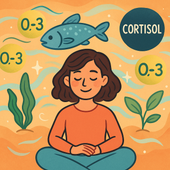
Omega-3s and Cortisol: Fighting Inflammation Naturally
Omega-3s are more than heart-healthy fats — they’re natural cortisol regulators. 🌿 Learn how EPA and DHA help reduce chronic inflammation, calm the nervous system, and support stress recovery from the inside out. ✨
-
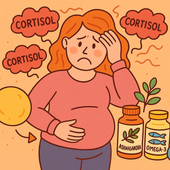
High Cortisol and Belly Fat: Can Supplements Help?
Chronic stress can make belly fat harder to lose — but supplements like ashwagandha, magnesium, and omega-3s may help restore cortisol balance. 🌿 Learn how science-backed nutrients support fat metabolism, calm your stress response, and bring your body back into harmony. ✨
-
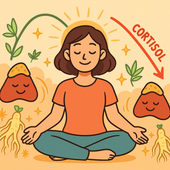
How Ginseng Can Support Energy and Cortisol Balance
Ginseng is one of nature’s most powerful adaptogens, helping your body handle stress without burning out. 🌿 Learn how this ancient root supports balanced cortisol, steady energy, and sharper focus — restoring vitality naturally and sustainably. ✨
-
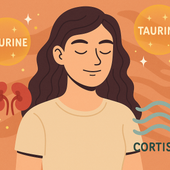
Taurine and Cortisol: Supporting Focus Under Stress
When cortisol surges, focus fades — but taurine helps restore balance. 🌿 Learn how this powerful amino acid calms your nervous system, regulates stress hormones, and sharpens concentration without jitters or fatigue. ✨
-
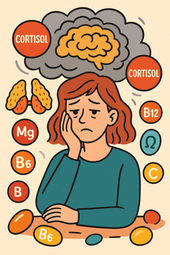
The Link Between Cortisol, Brain Fog, and Nutrient Deficiencies
When brain fog sets in, it’s not just in your head — it’s in your hormones. 🌿 Discover how cortisol imbalance and nutrient deficiencies like low magnesium, B vitamins, and omega-3s can cloud your focus and how restoring balance brings back mental clarity and calm. ✨
-
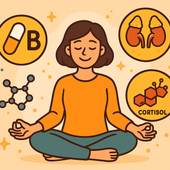
B Vitamins for Stress, Energy, and Cortisol Regulation
B vitamins are the foundation of stress resilience and steady energy. 🌿 Learn how this essential group of nutrients helps regulate cortisol, restore focus, and keep your nervous system calm — giving you balance from the inside out. ✨
-

Cortisol Imbalance and Chronic Fatigue: Can Supplements Help?
When chronic stress keeps cortisol high, fatigue and brain fog follow. 🌿 Learn how to rebalance your stress hormones naturally with calming nutrients, adaptogens, and lifestyle rituals that restore energy, focus, and inner peace. ✨
-

Adaptogen Stacks for Better Sleep and Lower Stress Hormones
Adaptogens can help your body recover from stress and sleep better by regulating key hormones like cortisol and adrenaline. 🌿 Learn how adaptogen stacks work to restore balance, calm the mind, and rebuild resilience — so you can rest deeply and wake renewed. ✨
-

Phosphatidylserine for Nighttime Cortisol Control
When stress hormones stay high at night, deep rest becomes impossible. 🌙 Discover how phosphatidylserine helps calm the brain, reduce nighttime cortisol, and restore healthy sleep rhythms — so you can wake up peaceful, clear, and recharged. ✨
-

Magnesium for Stress Relief and Cortisol Reduction
Magnesium is one of the most powerful natural tools for stress relief. 🌿 This essential mineral calms your nervous system, lowers cortisol, and helps your body recover from chronic tension. Learn how magnesium replenishes balance, improves sleep, and restores inner peace — naturally. ✨
-

Supplements to Improve Sleep by Balancing Cortisol
When cortisol stays high at night, sleep becomes a struggle. 🌙 Discover natural supplements that calm the nervous system, lower stress hormones, and restore your body’s natural rhythm. From magnesium and ashwagandha to L-theanine and phosphatidylserine, learn how to build deeper, more restorative rest. 🌿
-

Cortisol and Sleep: Why Stress Keeps You Awake
When stress keeps your body in fight-or-flight mode, cortisol refuses to calm down — and sleep becomes impossible. 🌙 Learn how elevated cortisol disrupts your circadian rhythm, suppresses melatonin, and turns restless nights into exhaustion. Discover how to restore balance and reclaim deep rest. ✨
-

L-Theanine for Cortisol Balance and Anxiety Relief
L-Theanine — the calming amino acid from green tea — helps quiet the mind and balance cortisol, the body’s key stress hormone. 🌿 Learn how it promotes calm focus, eases anxiety, and supports deep rest without sedation, backed by modern research and centuries of tradition. ✨
-

Rhodiola Rosea and Stress Resilience: A Natural Cortisol Regulator
Rhodiola rosea is one of nature’s most powerful tools for resilience. 🌿 This Arctic root helps balance cortisol, fight fatigue, and sharpen focus — keeping you calm yet energized even under stress. Discover the science behind Rhodiola’s adaptogenic power and how it helps your body thrive under pressure. ✨
-

Ashwagandha for Cortisol Balance: What the Science Says
Ashwagandha helps your body recover from chronic stress by calming the adrenal system and balancing cortisol — your key stress hormone. 🌿 Learn what science says about this powerful adaptogen, how it restores energy and focus, and why it’s one of nature’s most effective tools for modern stress relief. ✨
-

Supplements That Naturally Lower Cortisol Levels
When cortisol levels calm, your energy transforms — no more crashes or jitters, just steady focus and inner peace. 🌿 Learn which natural supplements and habits lower stress hormones, boost calm energy, and help your body thrive with balance instead of burnout. ✨
-

What Is Cortisol Imbalance? Symptoms You Shouldn’t Ignore
Cortisol — your body’s main stress hormone — keeps you alert and energized, but when it’s out of balance, it can drain your health. 🌿 Learn the signs of cortisol imbalance, from fatigue and anxiety to sleep disruption and stubborn weight gain, and discover how to restore calm, energy, and hormonal harmony naturally. ✨
-

The Best Daily Multivitamins for Menopausal Women
Menopause brings new nutritional needs that your old vitamin routine may no longer meet. 🌿 Discover how the right daily multivitamin can boost energy, balance mood, support bone and heart health, and keep your skin glowing. Learn which nutrients truly matter — from vitamin D to magnesium and B12 — to feel strong and vibrant every day. ✨
-

Antioxidants and Menopause: Fighting Inflammation Naturally
During menopause, oxidative stress and inflammation can quietly accelerate aging, fatigue, and skin changes. 🌿 Learn how antioxidants — from vitamins C and E to polyphenols in berries and green tea — help neutralize free radicals, reduce inflammation, and restore balance naturally. Discover the science of radiant, resilient aging. ✨
-

How CoQ10 Supports Heart Health After Menopause
After menopause, heart health becomes more important than ever. ❤️ Discover how CoQ10 — your body’s natural energy molecule — supports cardiovascular strength, restores vitality, and protects against oxidative stress. Learn how this essential nutrient helps keep your heart energized, balanced, and resilient through every stage of life. 🌿
-

Collagen Supplements for Skin and Joint Health Post-Menopause
After menopause, collagen loss affects both skin elasticity and joint comfort — but supplements can help rebuild from within. 🌸 Learn how collagen peptides, vitamin C, and other nutrients work together to restore firmness, reduce stiffness, and keep you glowing and mobile well into your next chapter. ✨
-

Calcium and Vitamin D: Protecting Bone Health in Menopause
Menopause brings hormonal changes that can weaken bones—but with the right nutrients, strength and stability can be rebuilt. 🦴 Learn how calcium and vitamin D work together to protect bone density, prevent fractures, and keep your body resilient. This guide explores nutrition, sunlight, and lifestyle habits that help your bones stay strong and vibrant for years to come. ☀️💪
-

Adaptogens for Energy and Resilience During Menopause
Feeling drained or emotionally scattered during menopause? 🌿 Discover how adaptogenic herbs like Ashwagandha, Rhodiola, and Ginseng can restore energy, balance cortisol, and build emotional resilience. Learn how these natural allies work with your body—not against it—to help you stay strong, focused, and calm through life’s hormonal changes. 🌸
-

Supplements That Help Beat Menopause Fatigue
Menopause fatigue can feel like more than tiredness—it’s a total energy crash. This guide explores how specific supplements, mindful breathwork, and therapy can help restore balance. Learn how nutrients like B vitamins, magnesium, and adaptogens rebuild your stamina, while breathwork and emotional healing calm your nervous system and bring vitality back to your days. 🌿✨
-

Herbal Blends for Menopausal Restlessness: Finding Calm in Transition
Herbal blends bring the wisdom of nature into moments of rest and renewal. Discover how soothing herbs like chamomile, lemon balm, and ashwagandha work together to calm menopausal restlessness, balance hormones, and invite deep relaxation. 🌿💫
-

Magnesium + Glycine for Deep Sleep During Menopause
Nutrients like magnesium, glycine, and B vitamins form the foundation for deep, restorative sleep during menopause. Discover how these natural compounds calm your nervous system, balance hormones, and help you wake up refreshed and recharged. 🌿💤
-

Melatonin and Menopause: Restoring Your Sleep Cycle
Nutrients are the foundation of hormone balance and energy. Learn how vitamins, minerals, and whole foods like greens, salmon, and berries nourish women’s bodies during menopause and beyond — restoring vitality, mood, and strength. 🌿🥗
-

How L-Theanine Helps With Menopausal Anxiety
Science continually deepens our understanding of the human body, from hormones to neurotransmitters. Discover how evidence-based research shapes modern wellness — bridging natural medicine, neuroscience, and hormone balance for healthier living. 🔬🌿
-

Can Ginkgo Biloba Improve Memory in Menopausal Women?
Hormone therapy can be a powerful tool for easing menopause symptoms and restoring balance. Learn how it works, the types available, and how to combine it safely with lifestyle and natural support for optimal well-being. 🌸💊
-

B Vitamins for Mental Clarity During Menopause
Nutrients are the foundation of mental and physical balance during menopause. Discover how vitamins, minerals, and whole foods like leafy greens, fish, nuts, and citrus can fuel energy, clarity, and calm while supporting hormonal health. 🌿✨
-

Mood Swings and Menopause: Natural Nutrient Support
Probiotics do more than support digestion — they help balance mood, hormones, and immunity too. Learn how a healthy gut microbiome can ease menopause symptoms, boost energy, and improve emotional resilience naturally. 🌿🦠
-

Brain Fog in Menopause: Supplements That May Help
Supplements can be powerful allies in restoring balance, energy, and focus—especially during menopause. Learn how nutrients like omega-3s, vitamin D, magnesium, and herbal adaptogens work together to support brain health, reduce stress, and promote lasting vitality. 🌿💊
-

Adaptogen Stacks for Reducing Night Sweats
Hormone detox isn’t about cleansing your body—it’s about restoring flow. Learn how the liver, gut, and endocrine systems work together to eliminate hormone buildup and how herbs like milk thistle, dandelion, and schisandra support balance, clarity, and natural vitality. 🌿💫
-

Cooling Menopause Symptoms with Herbal Support
Ashwagandha is one of nature’s most powerful adaptogens, helping women manage stress, sleep better, and balance hormones naturally. Discover how this ancient root supports calm energy, emotional resilience, and relief from menopause-related anxiety and fatigue. 🌿💫
-

Evening Primrose Oil and Menopause: What the Research Says
Hot flashes are one of the most common—and frustrating—symptoms of menopause. Discover what causes them, why the body’s “internal thermostat” becomes unbalanced, and the natural supplements and lifestyle shifts that can help you cool down, rest better, and feel more in control. 🔥💧
-

How Black Cohosh Helps with Menopausal Symptoms
Sleep disturbances are among the most exhausting symptoms of menopause—but they don’t have to rule your nights. Discover how natural strategies and calming supplements can help you fall asleep faster, stay asleep longer, and wake up feeling truly restored. 🌙💤
-

Natural Supplements That May Reduce Hot Flashes
Hot flashes can disrupt sleep, confidence, and daily comfort—but natural relief is possible. Discover the best research-backed supplements like black cohosh, red clover, and licorice root that may reduce hot flashes, balance hormones, and restore inner calm during menopause. 🌿💫
-

Omega-3s and Menopause: Supporting Mood and Inflammation
Omega-3 fatty acids are essential for hormonal harmony, brain function, and emotional balance—especially during menopause. Learn how these healthy fats reduce inflammation, support heart health, and restore calm, vitality, and focus through every stage of midlife. 🌊💫
-

The Role of Vitamin D in Menopausal Health
Vitamin D plays a powerful role in menopausal health—supporting bone strength, hormone balance, and mood stability. Discover how optimizing your vitamin D levels can improve sleep, energy, and emotional well-being while protecting long-term vitality through every stage of menopause. 🌞💪
-

Magnesium for Menopause: Relaxation, Sleep, and Hormonal Support
Self-regulation is the art of staying calm, centered, and in control—no matter what life throws your way. Learn how to strengthen emotional balance, manage stress responses, and cultivate inner peace through mindful techniques that reconnect your heart, body, and brain. 🌿💫
-

Can Adaptogens Like Ashwagandha Ease Menopausal Symptoms?
Brain fog during menopause can make even simple tasks feel overwhelming—but you’re not losing your sharpness, your hormones are simply shifting. Discover how adaptogens like ashwagandha and key nutrients can restore mental clarity, balance cortisol, and bring calm focus back to your day. 🌿🧠
-

Supplements That Support Hormonal Balance During Menopause
Herbal supplements have supported women’s health for centuries—and modern science is finally catching up. From ashwagandha and maca to red clover and rhodiola, discover how nature’s most trusted herbs can calm stress, balance hormones, and enhance energy through every life stage. 🌿✨
-

The Ultimate Motivation Stack: Supplements That Work Together
Discover how therapy helps restore motivation, focus, and emotional balance alongside supplement and mindset strategies. This empowering article explores how addressing thought patterns and emotional blocks through therapy can complement biochemical tools for long-term drive and well-being. 🧠💬
-

Entrepreneurial Drive: Can Supplements Help You Avoid Burnout?
Entrepreneurship demands energy, creativity, and mental resilience—but without balance, it leads to burnout. This in-depth article explores how nootropic supplements, adaptogens, and mindset tools can help entrepreneurs sustain motivation, manage stress, and keep their drive sharp for the long haul. 🚀💼
-

Supplements for Students: Staying Motivated Through Exams
Feeling burned out before finals? Discover how the right supplements can help students stay focused, calm, and motivated through exam season. This guide explores science-backed nutrients, brain-boosting herbs, and mindset tools that fuel clarity, memory, and stress resilience when it matters most. 🎓⚡
-

How Nootropic Stacks Can Enhance Drive and Focus Together
Discover how nootropic stacks can reignite both your drive and focus by balancing key neurotransmitters like dopamine and acetylcholine. This in-depth guide explores the science behind motivation, how supplements enhance cognitive performance, and how breathwork and therapy complete the picture for lasting mental clarity. 🧠✨
-

Natural Pre-Workout Supplements for Motivation and Mental Sharpness
Adaptogens are nature’s stress balancers 🌿 — powerful herbs like Ashwagandha, Rhodiola, and Holy Basil that help your body stay calm, focused, and resilient. By regulating cortisol and supporting energy balance, they boost motivation, endurance, and emotional stability — naturally. 🌞🧠


















































